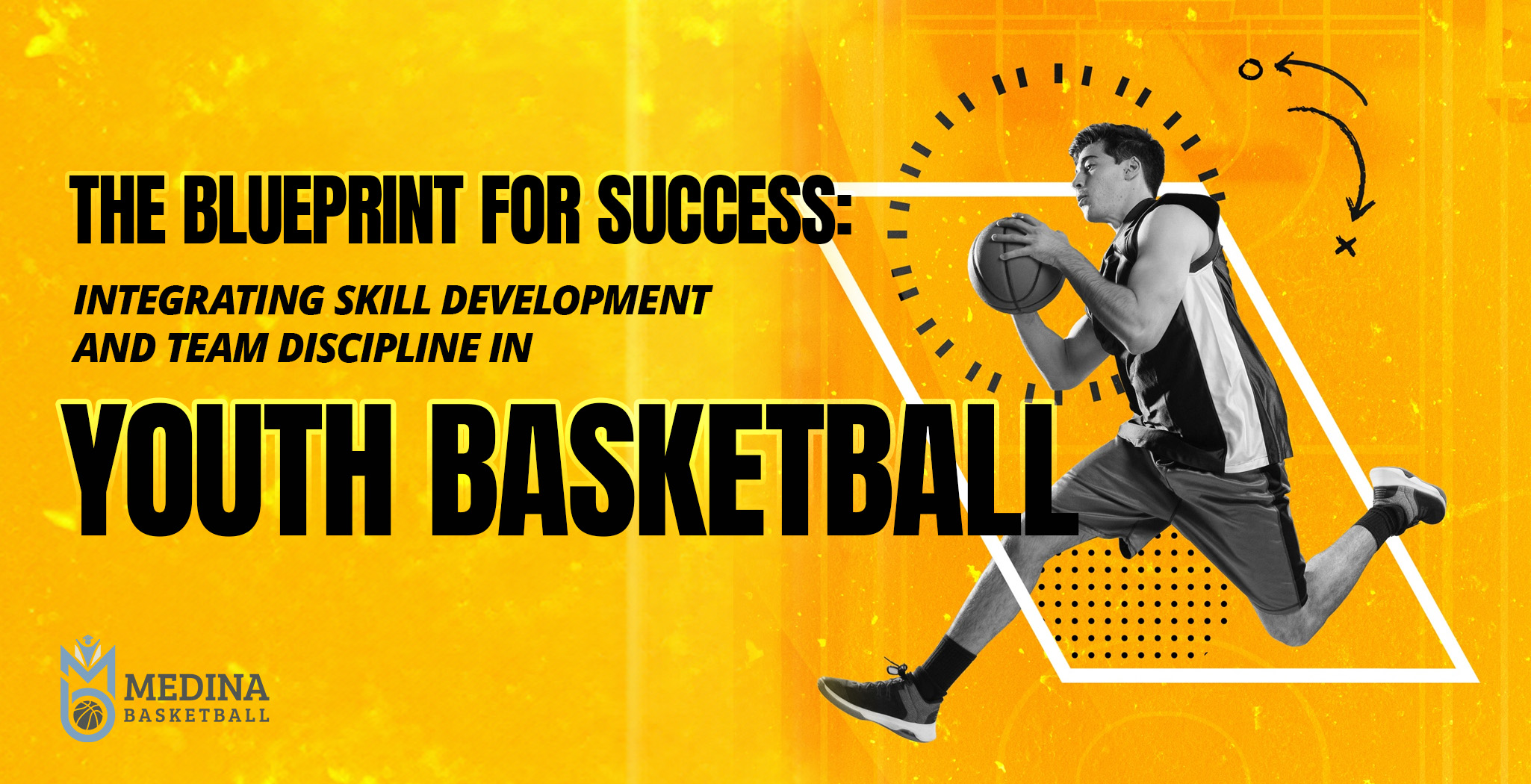Picture this: the buzzer sounds, the crowd roars, and you're on the court, ready to…

Picture this: a basketball court alive with the rhythmic dribble of eager players, each bounce echoing the aspirations of young athletes. It’s not just a game; it’s a canvas where the art of balance transforms the ordinary into the extraordinary. In this dynamic arena, we’re not merely talking hoops; we’re diving headfirst into the alchemy that transforms skill development and team discipline into a success story.
But what’s a game without challenges? The court isn’t always a smooth ride; it’s a rollercoaster of trials and triumphs. Whether you’re a seasoned coach, a passionate player, or a cheering parent, the court will always have its challenges.
Importance of Individual Skill Development in Youth Players
In youth basketball, a universal truth echoes from the courts to the bleachers: individual skill development is the cornerstone of growth. It’s not just about scoring baskets; it’s about empowering young players to unlock their full potential, setting the stage for a journey that transcends the confines of the court.
- Elevating Performance: Dribbling, passing, shooting, finishing, and footwork are the foundations of skill development. Training and mastering each area will lead young players to have an advantage over their peers on game day. Great coaching helps to give the edge to players willing to put in the work. Each game is a test to evaluate a player’s growth and an opportunity to identify more areas to improve performance.
- Building Confidence: Picture a young player confidently executing a crossover dribble or sinking a three-pointer with precision. Individual skill mastery isn’t just about physical finesse; it’s a psychological game-changer. As players witness their growth, they begin to develop a confidence that can last a lifetime. Each successful move is a testament to their hard work, transforming self-doubt into a fearless pursuit of victory.
- Nurturing Versatility: The beauty of youth basketball lies in its diversity of skills. Whether it’s guarding the ball, being an accurate passer, or learning to time a rebound, versatility is the hallmark of a well-rounded player. Individual skill development paves the way for versatility, enabling players to adapt to various game scenarios. A versatile player isn’t confined to a single role; they become the Swiss Army knife of the team.
- Long-Term Player Development: Beyond the buzz of youth competitions, individual skill development lays the foundation for a player’s enduring basketball journey. What’s honed in the early years becomes the bedrock of a lifelong affinity for the game. Coaches aren’t just molding players for today’s match; they’re shaping people who will learn to use practice as an opportunity to improve necessary skills for success. As players grow into other roles in life the lessons in personal development will live on.
Individual skill development isn’t a mere chapter—it’s the narrative that defines a player’s trajectory. As coaches, parents, and players alike, let’s embrace the journey of skill refinement, recognizing that each practice session isn’t just a rehearsal; it’s a step toward perfection. It’s time to unleash the full potential of our youth players, one skill at a time.
Key Skills to Elevate Youth Basketball Excellence
When it comes to youth basketball, the roadmap to success isn’t a one-size-fits-all affair. It’s a tailored journey, where each player hones a unique set of skills that collectively elevate the entire team.
Shooting Techniques: Precision Beyond the Arc
- Mastering the Art of Shooting:
- Putting the ball in the basketball consistently is a never-ending cycle of developing shooting fundamentals and getting repetitions. Coaches must emphasize the fundamentals: mechanics, balance, and rhythm.
- Developing a reliable jump shot and free-throw accuracy gives any player value to their team. There are always minutes available to players that can shoot the ball at a high level.
- Three-Point Shooting:
- In the era of fast-paced basketball, the ability to make three-pointers can set a player apart in the rotation. Coaches should focus on cultivating the confidence and technique required for accurate long-range shooting, but never at the expense of great mechanics.
- Through targeted drills and simulated game scenarios, players can evolve from occasional sharpshooters to consistent three-point threats.
Ball Handling: The Dance of Dexterity
- Foundations of Ball Handling:
- Dribbling isn’t just about avoiding defenders; it’s a dance of control and agility. Coaches must instill a strong foundation by emphasizing proper hand placement, a low center of gravity, and the importance of being efficient with the use of the dribble.
- Players should develop a diverse range of dribbling skills, with an emphasis on limiting dribbles as often as possible Mastery of this concept not only enhances individual play but also facilitates smoother team coordination.
- Court Vision and Passing Precision:
- Passing is the most underdeveloped skill in youth basketball today. Merely having the ability to pass and catch can connect all 5 players on the floor offensively.. Coaches should stress the importance of court vision and passing accuracy.
- Elevating passing skills transforms players into facilitators, ensuring that the ball moves seamlessly within the team. A well-timed assist can be as influential as a successful shot.
Defensive Skills: The Art of Containment
- Defensive Stance and Footwork:
- Defense is the unsung hero of basketball, and coaches must cultivate a defensive mindset from the ground up. Emphasis on proper defensive stance, lateral movement, and quick footwork lays the groundwork for effectively guarding the ball.
- A player who can stay in front of their opponent disrupts offensive plays and simplifies team defense by not requiring help from teammates against penetration.
- Steals, Blocks, and Rejections:
- Beyond containment, defensive skills extend to creating turnovers and defensive stops. Coaches should encourage players to develop anticipation, timing, and the skills necessary to get a deflection defensively.
- A well-executed steal or block not only prevents a basket but also creates an opportunity for the team to play in transition offensively. This is the time a team is most dangerous to score.
Rebounding: Dominance in the Paint
- Positioning and Timing:
- Rebounding is a game within a game, demanding a keen understanding of positioning and timing. Coaches should guide players on the importance of boxing out opponents, reading the trajectory of the ball, and securing rebounds with two hands.
- A team that dominates the boards enjoys second-chance opportunities and limits the opposition’s offensive possessions. Rebounding is the physical manifestation of a team’s determination.
Offensive and Defensive Rebounding Strategies:
- While defensive rebounding ensures the prevention of second-chance points, offensive rebounding creates additional scoring chances. Coaches should instill a balanced approach, emphasizing the importance of crashing the boards on both court ends.
- By developing a strategic mindset for rebounding, players contribute not only to their stats but also to the team’s overall success.
Team Discipline in Youth Basketball
Defining Team Discipline in Youth Basketball
- Unity in Purpose:
- Team discipline is more than a set of rules; it’s a shared commitment to a common goal. In youth basketball, it manifests as a collective understanding among players about the importance of adhering to team values, both on and off the court.
- It encompasses a code of conduct that extends beyond the game, fostering a sense of responsibility, respect, and dedication among team members.
- Respect for Roles and Authority:
- Discipline within the team structure involves acknowledging and respecting the roles of each player and the authority of coaches. It’s about understanding that individual success is intertwined with the success of the team.
- Respectful communication, attentiveness during coaching sessions, and a willingness to follow team strategies are all elements of team discipline that contribute to a harmonious basketball environment.
The Role of Discipline in Fostering Teamwork
- Creating a Cohesive Unit:
- Team discipline catalyzes creating a cohesive unit on the court. When players adhere to shared values and follow the team’s game plan, it leads to a synchronized effort greater than the sum of individual talents.
- Discipline facilitates the understanding that success is a collective achievement, encouraging players to support each other, celebrate victories together, and navigate challenges as a unified front.
- Building Trust and Accountability:
- Trust is the currency of successful teams, and discipline is the foundation upon which trust is built. When players consistently exhibit discipline in their actions, teammates can rely on each other, both in critical moments during games and in the day-to-day grind of practices.
- Discipline also instills accountability; players understand that their actions impact the entire team. This accountability fosters a culture of responsibility, where each member is committed to upholding the team’s standards.
Strategies for Instilling Discipline in Youth Basketball Teams
- Establishing Clear Expectations:
- The journey towards discipline starts with clear expectations. Coaches must articulate and communicate the team’s values, rules, and goals. This clarity provides a roadmap for players, helping them understand what is expected of them on and off the court.
- Regular team meetings and discussions can serve as platforms for reinforcing these expectations, ensuring that every player is aligned with the team’s vision.
- Consistent Reinforcement of Team Values:
- Discipline is a habit, not an event. Coaches should consistently reinforce team values through positive reinforcement for adherence and constructive feedback for improvement.
- Celebrating instances where players demonstrate discipline, whether it’s showing sportsmanship in a tough loss or putting in extra effort during training, reinforces the importance of these behaviors.
Team-Building Activities:
- Beyond the court, team-building activities play a crucial role in instilling discipline. Whether it’s community service projects, leadership workshops, or bonding retreats, these activities create a sense of camaraderie among players and reinforce the idea that they are part of something larger than themselves.
- Through shared experiences, players develop a deeper connection, strengthening the fabric of the team and embedding discipline into the team culture.
The Role of Parents in Supporting Both Skill Development and Team Discipline
Parents, you are the unsung champions on the sidelines, holding the keys to unlocking your child’s full potential in youth basketball. Your involvement extends beyond cheering from the bleachers; you are integral in nurturing both skill development and team discipline.
Skill Development Advocates:
- Encourage and facilitate regular practice sessions at home to reinforce skills learned during team practices.
- Attend games, providing positive feedback and constructive criticism to motivate improvement.
- Foster a love for the game by engaging in basketball-related activities and discussions.
Reinforcing Team Discipline:
- Reinforce the importance of teamwork, respect, and responsibility both on and off the court.
- Model sportsmanship and fair play, showcasing the values integral to team discipline.
- Communicate openly with coaches, aligning your support with the team’s goals and values.
Remember, your active participation is a game-changer, shaping not only their basketball journey but instilling life lessons that extend far beyond the court.
In the world of youth basketball, finding the delicate equilibrium between skill development and team discipline is truly an art form. It’s the fusion of both—where skill enhancement meets disciplined teamwork—that sets the stage for triumph.
As coaches, parents, and players, we must embrace the notion that skill development and team discipline are not mutually exclusive; rather, they are symbiotic forces that propel a youth basketball team toward greatness. It requires a thoughtful blend of personalized training and unified principles, recognizing that each player brings something distinctive to the court while adhering to the collective vision of success.
In essence, the art of balancing skill development and team discipline is an ongoing process—one that demands adaptability, communication, and a genuine passion for the game. As we witness the growth of our young athletes, let us not only celebrate their individual achievements but also appreciate the beauty of a well-disciplined team in action.
In the end, the true masterpiece on the court is not just the sum of individual talents or the display of disciplined teamwork; it’s the harmonious fusion of both that creates a legacy of success and sportsmanship in the world of youth basketball.



